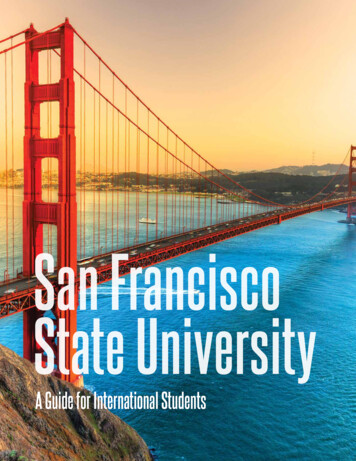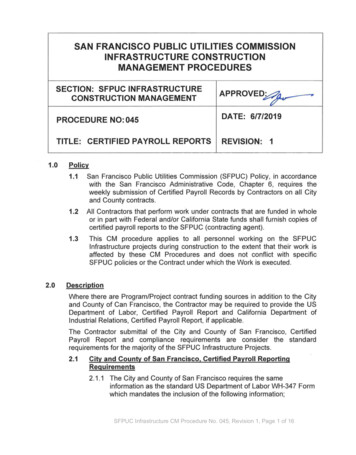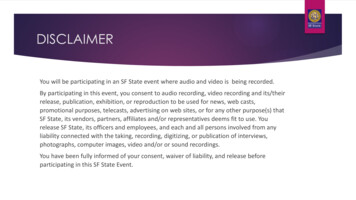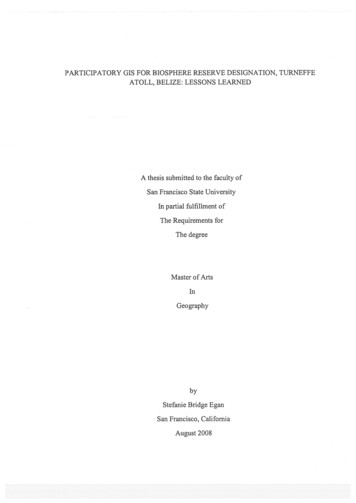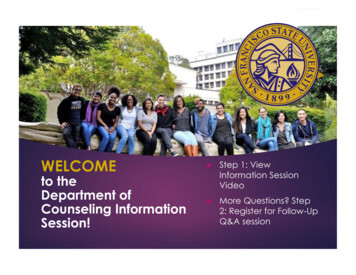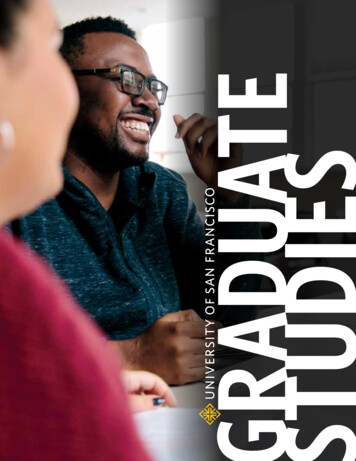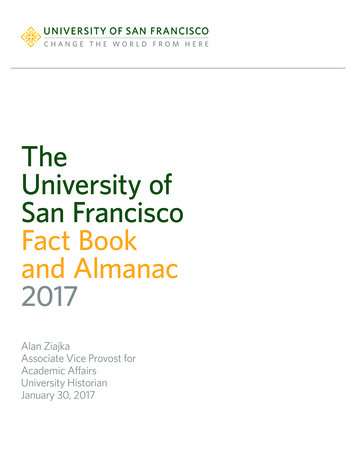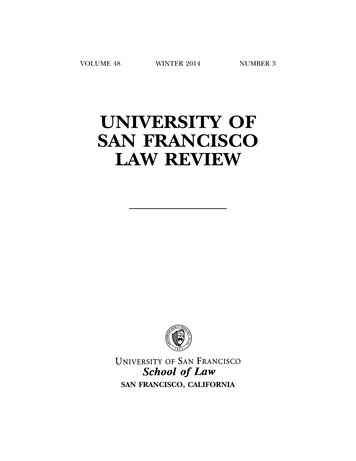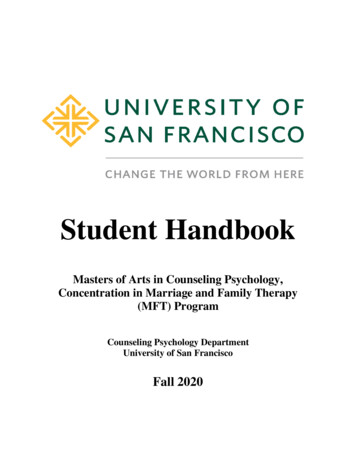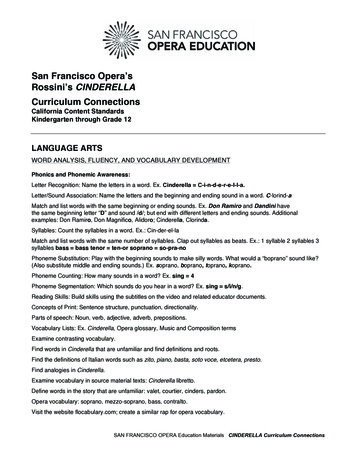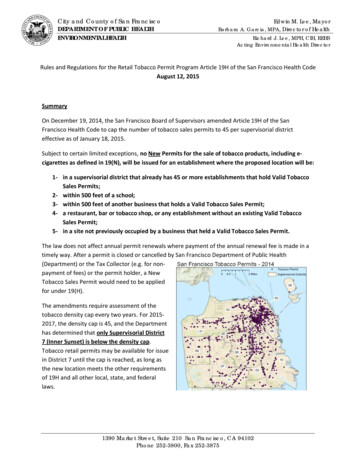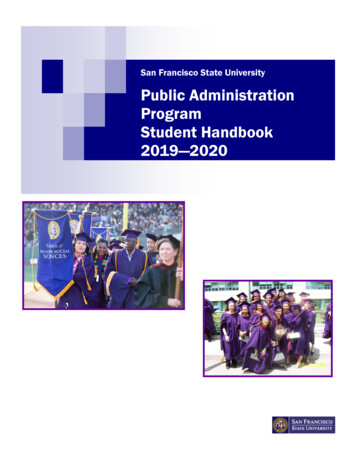
Transcription
San Francisco State UniversityPublic AdministrationProgramStudent Handbook2019—2020
Table of ContentsINTRODUCTION TO THE PROGRAMWelcome to the Public Administration Program! .2Public Administration and Communication .3Program History .4Ethics and Honesty in the Program .6Faculty.6Mission and Goals of the Public Administration Program .8University Resources .9Joining Your Professional Association .10BEGINNING THE DEGREE PROGRAMFirst Steps When Beginning the M.P.A. Degree .12Getting Started in Your First Semester .12More Information on the Downtown Campus Procedures .13Initial Course Selection .14Required Knowledge of American Government .14Developing Crucial Skills: Computer, Presentation, Team Work and Writing .15Advising .16Disabilities Accommodations .16Scholarships and Financial Assistance .17FULFILLING DEGREE REQUIREMENTSCurriculum .20The Internship Requirement .25E-Portfolio (Student Learning Portfolio).26GRADUATING WITH YOUR M.P.A. DEGREESteps to Graduation.28Career Planning .28Advancement to Candidacy .29Culminating Experience Process .30AWARDS AND HONORSPi Alpha Alpha .34Awards .34APPENDIX: LIBRARY HANDOUTS, PROGRAM AND UNIVERSITY FORMS .36
Student HandbookINTRODUCTION TO THE PROGRAMListening to former Mayor Willie Brown speakCareer Development Event
Student HandbookWelcome to the Public Administration Program at San Francisco StateUniversity. We are looking forward to working with you to help you achieve your careerand life goals. This handbook provides much of the information you’ll need to plan andmanage your studies with us. As always, the Public Administration Program website(http://pace.sfsu.edu/mpa) is kept up to date and is another place where you will findinformation and answers to important questions.The goal of the Public Administration Program at San Francisco State Universityis to prepare people for responsible positions in the public and nonprofit sectors. Thisincludes positions in all levels of government, and also in such entities as communitydevelopment corporations, nonprofit social service agencies, planning and consultingorganizations, and activities of private firms working in public affairs and public policy.Our student body includes persons proceeding directly from an undergraduate degreewithout prior experience and those with experience who wish to strengthen theircapabilities or prepare themselves for new opportunities. The Master of PublicAdministration is fully accredited by NASPAA, the membership organization ofgraduate education programs in public policy, public affairs, public administration, andpublic & nonprofit management; it is one of only three in the Bay Area which isaccredited.The program is based on the premise that policy and administration must beunderstood in relation to each other, and the core of the program seeks to developknowledge, skills, and understanding in both public policy and public administration.The common core of the program is heavily focused on essential knowledge and skillsfor public management. Beyond the core, the program offers six areas of emphasis asan opportunity for specialization. They are Public Management, NonprofitAdministration, Public Policy, Urban Administration, Environmental Administration, andCriminal Justice Administration.The requirements for the M.P.A., in general, and the specialty emphases, inparticular, are shown in detail on the following pages. Taking an emphasis forspecialization is optional, not mandatory. Those who choose not to pursue anemphasis may take appropriate electives to satisfy their professional needs and designtheir own emphasis. Students may choose courses relevant to their professionalinterests offered by other Programs and programs throughout the university.Graduates from the M.P.A. program pursue their professional careers in variousgovernment agencies at federal, state, and local levels, such as the FederalEnvironmental Protection Agency, the Program of Health and Human Services, theGovernment Accounting Office, city management, and state offices. In addition, manyothers find careers in nonprofit organizations, and consulting and research firms. Somego on to pursue a Ph.D. in Public Administration at other universities to enter into acareer in higher education.In 2011, through the effort of a University-wide reorganization, The School ofPublic Affairs and Civic Engagement was created. Public Administration is one of thefounding programs of PACE.PACE is a collaborative interdisciplinary unit of public affairs oriented scholarsPage 2
Student Handbookthat delivers degree programs in Environmental Studies, Gerontology, PublicAdministration, and Urban Studies and Planning. Students in these programs areimmersed in a problem-oriented learning environment that extends beyond theclassroom and into the community, the public arena, and theworld. Building on an ethos of social justice and sustainability, faculty prepare PACEgraduates with the critical and analytical skills necessary to understand and addressthe issues and challenges of the twenty-first century. To learn more about PACE, visitpace.sfsu.edu.Program Administration and CommunicationsAdministrative OfficeGraduate Coordinator: Dr. Janey Wang (advising and program oversight)Email: jqwang@sfsu.edu; Phone: 415-817-4456Director of Academic Services: Ms. Bridget McCracken (operations & support)Email: mpa@sfsu.edu; Phone: 415-817-4455Location: 835 Market Street, Suite 678—679Mailing Address: Public Administration Program, San Francisco StateUniversity, 835 Market Street, Suite 679, San Francisco, CA 94103Fax: 415-817-4464Administrative Office Hours: 11 am—7 pm, Mondays - Fridays. Note: TheGraduate Coordinator and other faculty members schedule limited ‘drop-in’office hours each semester. Check with individual faculty about their office hoursas they often change each semester. You’ll also find current office hours on coursesyllabi, posted in MPA office, and on the MPA website. Changes to scheduledoffice hours will be posted as they are known. Faculty hold office hours when theadministrative office is closed.Website: http://pace.sfsu.edu/mpa The Program considers its website its virtualbulletin board and it is kept up-to-date with announcements, important deadlines forstudents to know, and other information. All important Program documents(strategic plan, policies, student handbooks, etc.) are also available online on ourwebsite.Making Sure We Can Contact YouBe sure to activate your @mail.sfsu.edu email address and check it regularly orhave it forwarded it to an email you do check regularly. It is the primary mechanism wewill use to communicate with you. For more information about how to do that, visithttp://tech.sfsu.edu/guides/live-edu-emailIn addition, the Public Administration Program tracks students’ home email andmailing address listings for our students separate from the University. If you move andthen change your address online through My SFSU, those changes do not getcommunicated to the Public Administration Program. Please inform the MPA directlyoffice when your contact information changes by emailing mpa@sfsu.edu.Page 3
Student HandbookGetting Information about Events and Other NewsThe School of Public Affairs and Civic Engagement listservs will be an opportunity tostay up to date on current events and opportunities, important dates and reminders,and many other items related to your studies and career trajectories. We encourageyou to join the listserv in order to stay up to date on departmental happenings.In order to provide efficient communication to our students, we have created fourlistservs (email distribution list): pace-general@lists.sfsu.edu (for general information),pace-jobs@lists.sfsu.edu (for jobs listings) pace-internships@lists.sfsu.edu (forinternship listings) and pace-events@lists.sfsu.edu (for PACE related events).To subscribe to one of these listservs:1. Send the following message to one, or all, of the listserv addresses above:SubscribeBe sure that no signature or ads are also in the body of the email. A confirmatione-mail will be sent with instructions for completing the subscription process.To send messages to one of the listservs:Note: The message will be delivered to all members of the list. You will receive anotification if the message is rejected or if it needs a moderator's approval.1. Verify the List e-mail address on your Distribution List Subscriptions page, or in thee-mail you received when you subscribed to the list, i.e., listname @lists.sfsu.edu2. Use your e-mail client (i.e., OWA, Outlook, Mac Mail) to create a new message.3. Enter the list e-mail address in the To: field, compose and then send the message.If you have any questions, please contact us at pace@sfsu.edu.To unsubscribe from one of the listservs:Email the word unsubscribe to the address of the listserv from which you want tounsubscribe. A confirmation e-mail will be sent to the unsubscribing address. If youwish to unsubscribe an address other than the address you sent this request from, youmay specify address e-mail@domain.comProgram HistoryThe Public Administration Program was officially established as an independent,interdisciplinary graduate degree program in 1979, admitting eleven students that firstyear.Page 4
Student HandbookThe program was originally organized as a coordinated program with a committedgroup of interdisciplinary faculty from various academic units in the College ofBehavioral and Social Sciences, our home at the time. Their academic disciplinesrepresented a full cross-section of the social sciences. The founding faculty and theirPrograms were: Rufus Browning, Political Science Rich DeLeon, Political Science Dick Legates, Urban Studies Debbie LeVeen, Urban Studies Ray Miller, Social Science and International Relations Jack Osman, Economics Ray Pomerleau, Political Science Pat Purcell, Social Work Norm Schneider, Urban Studies Marjorie Seashore, Sociology Ruth Shen, Economics David Tabb, Political ScienceInitially, the Program was directed by Rufus Browning. Richard LeGates was the nextDirector, until a new Director was hired externally in a national search. For part of thisearly period, the Program was part of the Center for Politics, Policy and Administrationalong with the Departments of Political Science, International Relations, and the UrbanStudies Program.The first full-time Public Administration faculty member and Program Director,Professor Al Hyde, was hired to direct the Program in 1984. Professor Yong Hyo Choserved as Director from 1989 to 1997, when Professor Genie Stowers assumed thatrole. Professor Stowers lead the Program through a period of phenomenal growth,including a 30 percent growth in the size of the student body between 1999 and 2000.Soon thereafter, the Program welcomed its fifth full-time core faculty members. Thiscrucial milestone was accompanied by many changes—revised curricula, newculminating experience requirements, changes in Program prerequisites, and newadmissions processes, and NASPAA reaccreditation. Professor Stowers served asDirector until 2012, when Professor Sheldon Gen took over.Professor Gen lead the program through a number of curricular and administrativechanges, including joining with three other academic units with three other academicunits (Urban Studies and Planning, Criminal Justice, and Environmental Studies) tocreate the School of Public Affairs & Civic Engagement (PACE), launching a newcurriculum, and another successful NASPAA reaccreditation.The Program currently still has five full-time core faculty members. Professors StowersPage 5
Student Handbookand Gen remain members of the core Public Administration faculty, along with Drs.Ernita Joaquin and Janey Wang. Professor Jennifer Shea assumed the position ofDirector in July 2015 and became Associate Director of PACE in January 2016. In Fall2016, the M.A. in Gerontology Program joined PACE.Ethics and Honesty in the ProgramThe Public Administration Program at San Francisco State University expects ethicaland honest behavior in its students, faculty and staff. The Program maintains a zerotolerance policy towards cheating, plagiarism or any other form of academicdishonesty.Plagiarism, defined broadly, is the presentation of another's words and/or ideas asone's own without attributing the proper source. It is grounds not only for failure of agiven piece of work, which could result in failure for the entire course, it could alsoresult in being reported to the administrative body responsible for student conductviolations and being subject to disciplinary action, which includes expulsion,suspension, and/or probation.The Program regards any form of cheating including plagiarism as a serious matter ofacademic dishonesty which threatens the integrity of the assessment process andaward of grades and/or the degree, to the detriment of all other students and graduatesof the University.Students are expected to cite materials and ideas based upon the work of others,using appropriate citation methods. Students who have cheated will receive a grade of0 on the assignment in question. The appropriate citation strategies will be covered inPA 700, PA 705 and in other classes; in general, the APA in-text citation style isutilized.FacultyCore FacultyThe Public Administration Program has five full-time faculty members as well asfaculty affiliated with other Programs and programs. The 2018-2019 list of PublicAdministration faculty is: Sheldon Gen (Ph.D., Public Policy, Georgia Institute of Technology, 2004)Associate Professor: public policy, research methods, policy analysis and programevaluation, environmental policy. (sgen@sfsu.edu / 415-817-4458) M. Ernita Joaquin (Ph.D., Political Science, Northern Illinois University, 2007)Associate Professor: public administration, organizational theory, intergovernmentalrelations and networks, administrative theory, public sector reform.Page 6
Student Handbook(ejoaquin@sfsu.edu / 415-817-4460) Jennifer Shea (Ph.D., Public Policy, University of Massachusetts—Boston, 2008)Associate Professor, MPA Graduate Coordinator and Associate Director of theSchool of Public Affairs and civic Engagement: public administration, nonprofitadministration, organizational behavior, and leadership. (jshea@sfsu.edu / 415-817-4462) Genie Stowers (Ph.D., Political Science, Florida State University, 1987)Professor: public administration, public information management, budgeting andfinancial management, analysis and evaluation, research methods.(gstowers@sfsu.edu / 415-817-4457) Janey Q. Wang (Ph.D., Public Affairs, Indiana University, 2009)Associate Professor: public administration, budgeting, research methods, policyanalysis. (jqwang@sfsu.edu / 415-817-4456)LecturersThe Public Administration Program also utilizes part-time faculty, who are highlyqualified practitioners and academicians. A partial list of these individuals is includedhere, along with their teaching interests: Margaret Brodkin, MSW: systemic change, policy advocacy, child welfare policy Kevin Hickey, MPA: leadership, nonprofit administration, policy advocacy Al Hyde, Ph.D.: public administration, public management Regina Neu, MsED: nonprofits and fundraising Joel Mackey, J.D.: nonprofits the law and leadership Bryan Montgomery, MPA: public administration, public management Glen Rojas, MBA: local government and public policy Carol Silverman, Ph.D.: research methods, program evaluationFaculty EmeritaIn addition, we are proud to continue our affiliation with our faculty emerita—faculty who created and supported our Program for many, many years, but haveretired. Lilly Berry, Ph.D., Professor, Psychology. Human resources management, I/OPsychology. (Retired 2004) Rufus Browning, Ph.D. Professor, Political Science. Urban Administration,research methods. (Retired 2004) Richard DeLeon, Ph.D. Professor, Political Science. Urban politics, researchmethods and statistics. (Retired 2005) Carol Edlund, Ph.D. Organizational behavior, leadership, ethics, and humanresources management and general public administration. (Retired 2011) Richard LeGates, Professor Urban Studies). Urban growth management, housingand law. (Retired 2009) Debbie LeVeen, Ph.D. Professor Urban Studies. Urban studies, health politics.Page 7
Student Handbook (Retired 2006)Katherine Naff, Ph.D., Professor, Public Administration. Human resourcesmanagement, representative bureaucracy, public management, administrative law(Retired 2012)Jack Osman, Ph.D. Professor, Economics. Microeconomic applications to publicsector problems, education financing, public finance. (Retired 2004)Raymond Pomerleau, Ph.D. Professor, Political Science. Human resourcemanagement, organizational behavior. (Retired 2001)Marjorie Seashore, Ph.D. Professor, Sociology. Organizational behavior,educational policy, evaluation, integrative and collaborative services. (Retired 2004)Mission and Goals of the Public Administration ProgramThe Public Administration Program has engaged in strategic planning since1997 and has updated its plan regularly. The Program frequently updates its plan toincorporate changes and achievements of its goals. The strategic plans developedover time can be found at its website.Mission StatementThe mission of the
Email: mpa@sfsu.edu; Phone: 415-817-4455 Location: 835 Market Street, Suite 678—679 Mailing Addr
